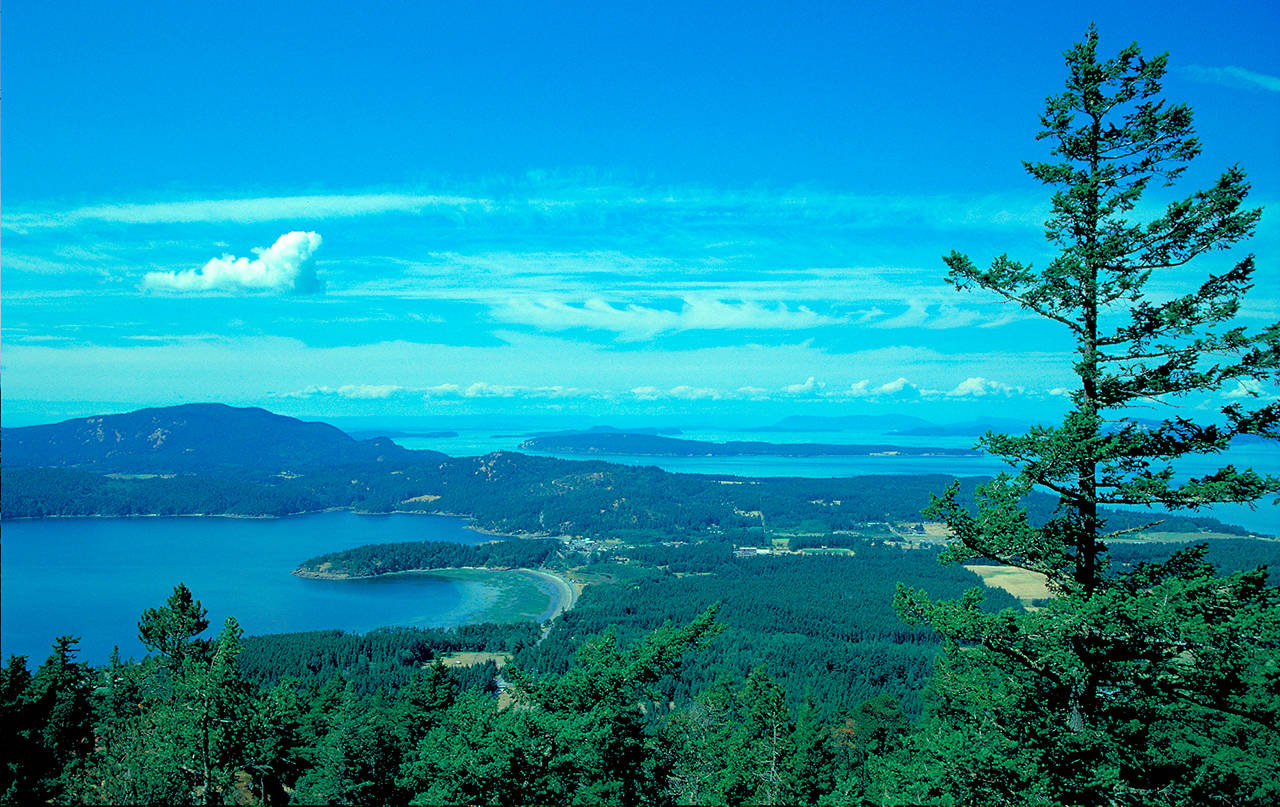Madrona Point, a peninsula of green that juts into the waters of East Sound, has been a topic of debate for more than a century.
Local photographer and Madrona Point activist Peter Fisher gave a presentation on the vision for the sacred land to an Odd Fellows Hall full of captive listeners on Feb. 17.
“I, myself, would love to see a facility built whose mission is to teach us to open our hearts, to love our enemies, to heal our hurts and free our spirits,” Fisher said. “For the Orcas and Lummi communities to come together and create a proposed Ts’el-xwi-sen’ Center would be a positive move towards cooperation to heal and protect land sacred to us all: Madrona Point.”
Ts’el-xwi-sen’ is the Lummi name for a village that once existed where Eastsound stands today. The Lummi Nation, the original inhabitants of the San Juan Islands, used Madrona Point as a burial ground – a practice that continued when white settlers arrived.
“They didn’t just come here to fish. That’s what I learned when I came here, is that we only came to fish. My dad’s people lived here for hundreds and hundreds of years. When this was still part of the mainland before they become islands,” said Dean Washington, a member of the Lummi Nation and master canoe builder, “the people that came from here lived in the canoes all their lives. They were the protectors of the San Juans of the Pacific Northwest. They were the warriors.”
Fisher and Washington first met at a meeting of the Lummi Cultural Committee in 2014.
“It was at this meeting that I heard Dean speak passionately about the same things I care about: Getting our kids together, learning from each other, building friendships. Kids and Canoes is how we plan to put this dream into action,” Fisher said. “And so I invited Dean to come speak to us today because we share a desire to build a relationship between our communities that is mutually beneficial.”
The struggle over who actually owned Madrona Point began in 1887 when the Trustees of the Cemetery Association intended to sell the land. A lawsuit was filed by Native Americans who argued that the trustees had no right to sell it. The group of Native Americans won the initial case, but the State Supreme Court later ruled in favor of the trustees.
The 30-acre land was sold to the Harrison family in 1890, eventually housing an inn and several cabins. The inn closed in 1967 when Seattle businessman Norton Clapp purchased the property, and then, in the mid-1980s, he announced a plan to build an 88-unit condominium development.
A grassroots effort to save the point quickly formed among islanders and the Lummi Nation.
“This has been the heart, the sacred heart and the geographical center of Orcas Island,” Fisher told a KOMO television crew that covered the controversy on Feb. 10, 1989. Fisher said he and his fellow Madrona Point supporters approached the Church Council of Greater Seattle – which had recently issued a formal apology to the native population for ongoing persecution – for its support in saving the point from development.
With help from the Church Council, and eventually Congress, the property was purchased for $2.2 million and subsequently returned to Lummi Nation.
In a memorandum of understanding signed by the Lummi Nation and San Juan County in 1989, the tribe agreed to “manage the property as an open space, natural area and forest, open to individuals and groups for walking and educational purposes” with permission of the tribe.
But when islanders misused the area, the Lummi installed a “keep out” sign in 2007.
The Lummi had a plan, explained Fisher, for Madrona Point to be utilized as an environmental and cross-cultural education center. Fisher said he believes this vision has not come to fruition because “fundamental flaws” in the agreement signed between Lummi and the county.
Both Fisher and Washington wish to see the cultures of existing islanders and the Lummi Nation unite and move toward a solution for Madrona Point that is advantageous to both groups.
“It’s something that would benefit all of us. Over the years – hundreds of years – we’ve built these bridges that we can’t cross. There are no more bridges,” Washington said. “Just think what it would be like to see our children paddling together in a canoe, sitting on the beach and they’re learning some of the words from our language and we’re learning some of the ways of their people.”



